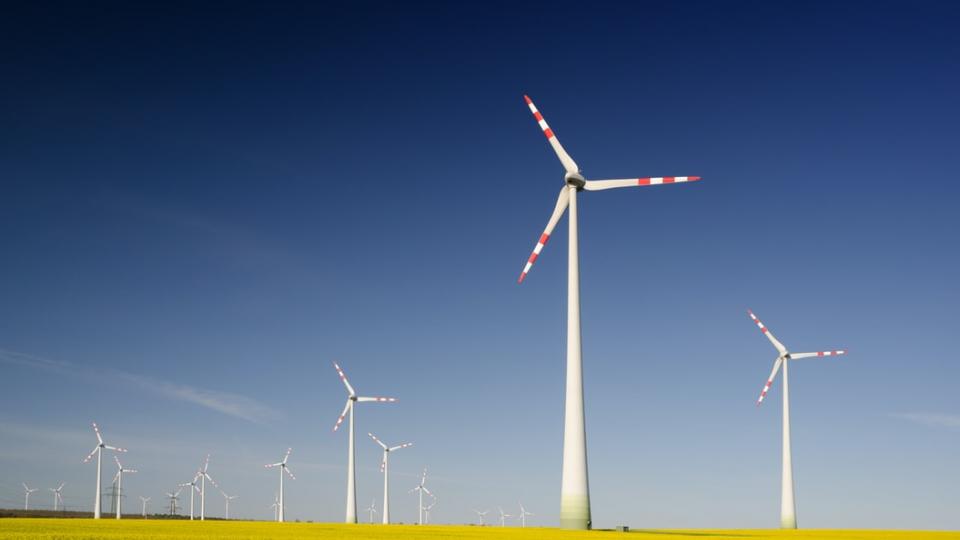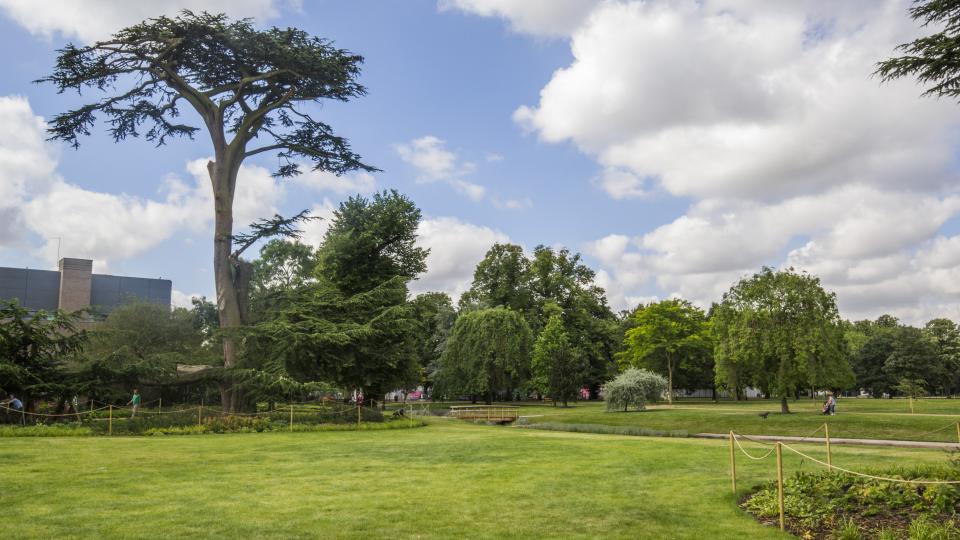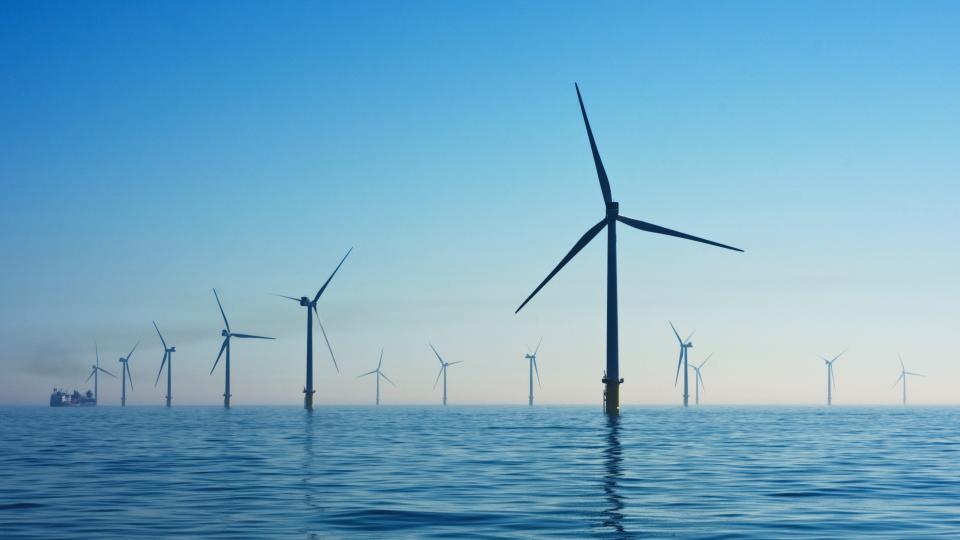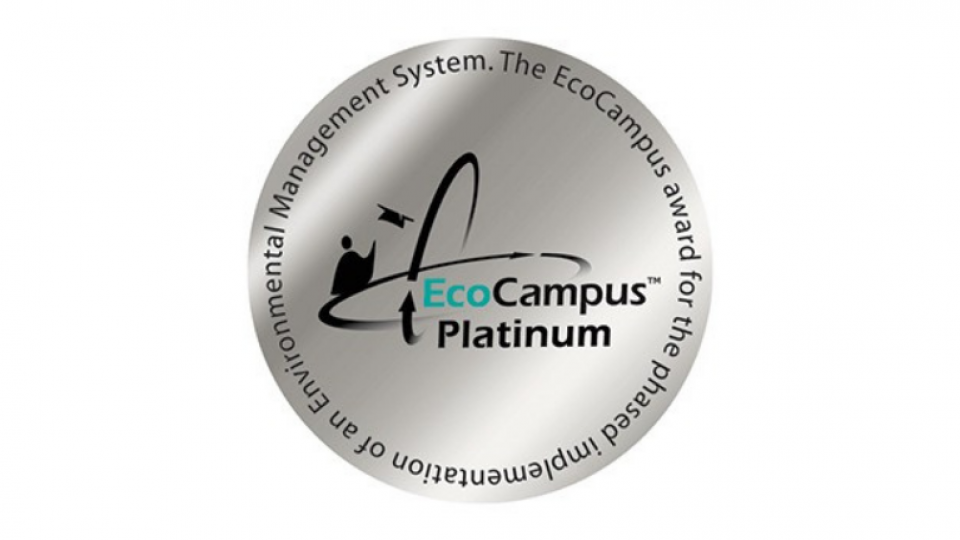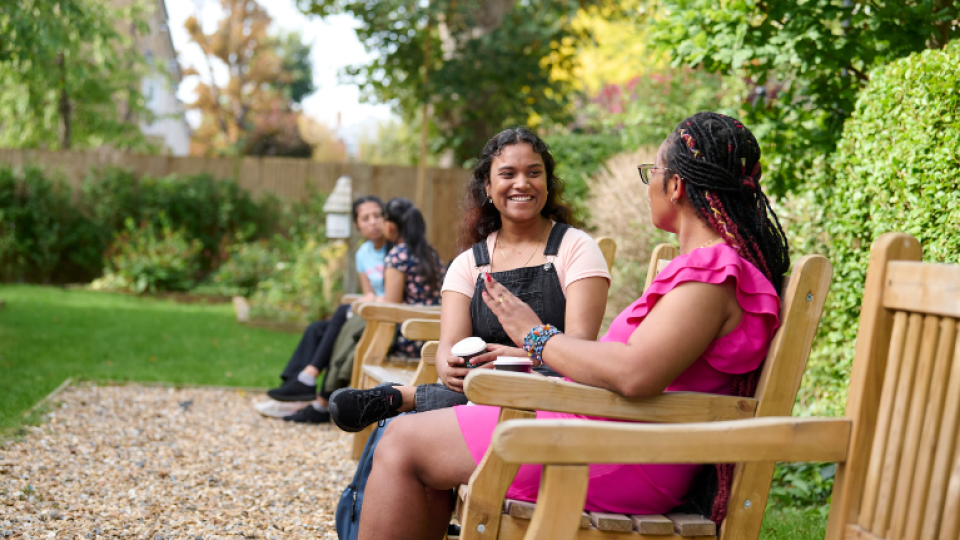
Sustainability -
teams and strategy
Intro / Jump menu
Find out more about the University of West London's teams, strategy and policies for sustainability.
Jump to each of our sections on:
Sustainability on campus
Find out more about what we are doing on campus to promote sustainability.
What we are doing
We are working hard to embed a culture of sustainability across our University and become a net-zero carbon institution by 2030.
We aim to become a leader in environmental and sustainability management by preventing pollution, complying with environmental legislation and having a positive impact on our environment and wider society.
Our achievements to date include:
- Achieving EcoCampus Platinum (ISO14001).
- Reducing carbon emissions associated with power and fuel consumption by almost 50% between 2015 and 2023.
- Declaring a Climate Emergency in 2020.
- Founding signatory of the One Planet Pledge initiative and targeting to become a net-zero campus by 2030.
- Installing renewable energy technologies, including the largest ground source heat pump unit across the higher education sector in the UK.
- Making a continuous investment in energy efficiency and waste management projects.
- Sustainable Restaurant Association awarded UWL’s Pillars Restaurant a 3-Star Food Made Good certificate in 2023.
- Receiving a 1st class award in the 2023/24 People & Planet University League. UWL is in the top five sustainable universities in London, the top 10 of modern universities, the top 10 of modern universities for carbon reduction and the top 10 of universities for sustainable food.
Environmental policy and strategy
The Environmental Policy demonstrates our commitment to reducing the University’s environmental impact.
The Policy is enacted through our Environmental Management System, which is our framework for managing our environmental impact and ensuring continuous improvement of our environmental performance.
Alongside our Environmental Policy is the University's Environmental Sustainability Strategy. This has been developed to address the requirements of the University Strategic Plan and to achieve the strategic objective to be net zero carbon by 2030.
Both the Environmental Policy and Environmental Sustainability Strategy are reviewed and updated annually by the Environmental Operations Group. The latest versions were approved in June 2024.
- Find out more in our sustainability policies section
Sustainability team
The Sustainability team work to bring staff and students across the University together to tackle issues surrounding climate change and the environment.
The University manages a wide range of services and therefore it is of great importance to us that we continue to improve the environmental performance of our estate and operations while increasing positive action toward a sustainable future among our staff, students and visitors.
-
Vice-Chancellor and Senior Management Group
The University’s sustainability programme is governed by the Board of Governors who set the vision for embedding sustainability into academic, research, and operation.
The main Executive Committee is the Vice-Chancellor’s Executive (VCE) who is responsible for the strategic planning and the academic focus of the University and drafting and approval of all key corporate documents, including the Environmental Sustainability Strategy and the Environmental Policy.
The wider forum for leading operational matters is the Senior Management Group (SMG).
-
Sustainability Management Board
The Vice-Chancellor’s Executive (VCE) is supported by the Sustainability Management Board (SMB). The SMB is accountable to the VCE for the delivery of sustainability-related activities in accordance with the University’s strategic plans and other external reporting obligations. The SMB is responsible for implementing the United Nations Sustainable Development Goals (SDGs). The SMB is comprised of representatives from the Heads of Professional Services, the Heads of Schools, and the UWL Students' Union. It is chaired by Dr Suresh Gamlath, Pro Vice Chancellor (Business Development), a member of VCE and Institution Lead for Sustainability. Members are also the Sustainability Champions for their respective Schools and Departments, encouraging all staff to participate in sustainability activities.
Members of the SMB include:
- Adeel Rajput, Head of Strategic Procurement
- Dr Amelia Au-Yeung, Dean of the Claude Littner Business School
- Andrew Preater, Director of Library Services
- Dr Bamo Nouri, Senior Lecturer and UNAI Lead for the School of Human and Social Sciences
- Claire Willitts, Executive Director of Property and Environment
- Davinder Sarai, Procurement Manager
- Grace Hunter, Head of Environmental Sustainability
- James Edmunds, Associate Pro Vice Chancellor & Dean of the London Geller College of Hospitality and Tourism
- Dr Jen Mayer, Head of the School of Human and Social Sciences
- Dr Jessica Frye, Head of CELT
- Joshua Heming, University Secretary and Registrar
- Lucy Avery, Senior Communications Officer for Marketing & Communications
- Professor Nicholas McKay, Director of the London College of Music
- Paul Lohneis, Head of the London School of Film, Media & Design
- Peter Cross, Senior Lecturer in Food Business and Nutritional Sciences
- Dr Peter Stiernstedt, Deputy Head of the School of Human and Social Sciences
- Professor Philipp Elliot-Wright, Head of the School of Law
- Professor Richard Morgan, Dean of the School of Medicine and Biosciences
- Roseanna Donnan, Student Experience Manager
- Sara Raybould, Deputy Vice-Chancellor (Education and Student Experience)
- Dr Suresh Gamlath, Pro Vice-Chancellor (Business Development)
- Tom Levitt, Associate Lecturer in the Claude Littner Business School
- Tracy McAuliffe, Director of Student Services
- Tye McMahon, CEO, Students’ Union
-
Environmental Operations Group
The Vice-Chancellor’s Executive (VCE) is also supported by the Environmental Operations Group (EOG). The EOG is accountable to the VCE for:
- Development of the University’s net zero carbon strategy and action plan.
- Maintenance of internal and external accreditations, and reporting obligations related to environmental sustainability.
- Delivery of actions in accordance with the University’s strategic plan and external requirements.
The EOG covers all aspects of environmental sustainability and any other measures as determined by the VCE or externally.
The EOG is comprised of representatives from the Heads of Professional Services, the Heads of Schools, the UWL Students' Union and on-site contractors. Representatives from the Unison and University and College Union (UCU) trade unions are members of the EOG. It is chaired by Claire Willitts, Executive Director of Property and Environment and member of VCE. As with the SMB, members are also the Sustainability Champions for their respective Schools and Departments, encouraging all staff to participate in sustainability activities.
Members of the EOG include:
- Mohammed Ahmed - Head of IT Service Delivery
- David Barnes - Health and Safety Manager
- Rob Carr - Head of Commercial Operations, UWLSU
- Dr Suresh Gamlath - Pro Vice Chancellor (Business Development)
- Amber Gardiner - Operations Manager (Soft FM), Equans
- Muhid Goni - Site Manager, Elior
- Alison Hawkings - UCU Representative
- Joshua Heming - University Secretary and Registrar
- Grace Hunter - Head of Environmental Sustainability
- Laura Paval - Hospitality and Culinary Arts Manager
- Adeel Rajput - Head of Procurement
- Nicholin Reed - Operations Manager (Soft FM), Equans
- Sarah Simpson - Unison Representative
- Dan Skelton - Environmental Sustainability Officer
- Claire Willitts - Executive Director of Property and Environment
-
Sustainability team
UWL’s day-to-day environmental sustainability activities are managed by the following people:
- Dr Suresh Gamlath, Pro Vice Chancellor (Business Development) and Institution Lead for Sustainability: Chair of the Sustainability Management Board and leads the University’s overarching sustainability approach including annual reporting.
- Claire Willitts, Executive Director of Property and Environment: Chair of Environmental Operations Groups and oversees the development and implementation of the environmental sustainability strategy, policies and initiatives.
- Grace Hunter, Head of Environmental Sustainability: leads the development and implementation of the environmental sustainability strategy, policies and initiatives
- Dan Skelton, Environmental Sustainability Officer: supports with the implementation of the environmental sustainability strategy, policies and initiatives.
- Efrat Tadmor, Deputy Director of Property Services: responsible for fleet and shuttle bus electrification projects and specialist waste initiatives.
- Nicholin Reed, Operations Manager, Soft FM Facilities & Waste: responsible for implementation of the waste management strategy including reduction and reuse activities
- David Ball, General Manager (M&E): responsible for environmental compliance and oversees energy management, waste operations and site maintenance.
- Peter Mugford, Technical Services Adviser (Energy): manages energy optimisation and implementation of renewable energy technologies
- Tom Levitt, Associate Lecturer (Sustainability): leads the Staff Sustainability Network.
The following individuals are involved in the implementation of sustainability action plans and compliance with environmental regulations:
- Amber Gardiner, Operations Manager, Soft FM Corporate Social Responsibility: supports the implementation of sustainability engagement activities with students and the community.
- Liz Evans, Administrator: provides administrative support to the environmental sustainability team.
- Lucy Avery, Senior Communications Officer: develops and shares sustainability communications and resources with the UWL community.
- Mohamed Ahmed, Head of IT Service Delivery: oversees digital sustainability policies and initiatives including IT waste reduction, reuse and recycling.
- Muhid Goni, Site Catering Manager: manages UWL’s on site sustainable food and catering strategy and initiatives.
- Peter Cross, Senior Lecturer in Food Business and Nutritional Sciences: oversees sustainable food initiatives for the London Geller School of Hospitality and Tourism and community food partnerships.
- Rudolph Ahmed, Ground Maintenance Manager: manages projects which support and enhance biodiversity on site.
You can contact the University’s Sustainability Team at environment.sustainability@uwl.ac.uk.
We also have an active Staff Sustainability Network, comprising of over 60 members and our Students' Union also has a network of Sustainability Champions. Visit UWLSU’s sustainability network page for more information.
-
Financial Resource
We are dedicated to investing in our campus to build a sustainable living environment. Funding for sustainability-related initiatives is made available through a mix of internal funding as well as external funding available to public sector organisations.
In June 2019, the University participated in the GLA Retrofit Accelerator-Workplaces programme by investing £800,000 into energy saving measures. The energy saving measures included LED lighting upgrades, BMS optimisation, variable speed drive installation, pipework insulation, boiler upgrades, and building fabric improvements. The works deliver carbon savings of 350 tCO2 per annum.
In January 2021, the University received a grant of £5.1m government funding to help decarbonise the estate. The funding supported retrofitting our buildings with low carbon heating, lighting and ventilation systems and installing renewable technologies. Whilst measuring the impact of this project is still ongoing it is estimated that it will save over 500 tCO2e per year.
In February 2024, the University secured further grant funding to expand our decarbonisation efforts at Ruskin College – part of the University of West London group in Oxford. The work here will include replacing the gas boiler and hot water systems with air sourced heat pumps and improving energy efficiency through works such as upgrading insulation.
In addition, over the past five years, the University has invested over £2m in deep retrofit projects to improve the energy efficiency of existing and new sites. Some of the energy efficiency measures include replacing inefficient ventilation and cooling systems, replacing fluorescent lighting with LEDs with intelligent control systems, and asset replacement projects that improve the environmental performance of building fabric and energy systems.
Careers and employment
The employability focused teams at the University of West London include the Careers and Volunteering Services, as well as the Placements and Employment Services. The employability teams are not part of a combined careers service. Our teams work together to help UWL students develop skills and access opportunities to go on to have successful fulfilling lives. This often goes hand in hand with sustainability skills and the consideration of ‘green careers’. Students’ development of Sustainability and Ethics are measured through our Graduate Attributes and driven by our Careers Education Framework.
We are currently completing consultations with students, staff and partners on whether it is necessary and fair to introduce an ethical careers policy which explicitly excludes extractive industries such as oil, gas and mining. Our employability statement outlines our current employer screening process.
-
Our teams
Careers and Volunteering Service
- Jonathan Eastwood - Head of Careers and Volunteering (jonathan.eastwood@uwl.ac.uk)
Careers Team
- Veejay Mistry - Careers Manager (Veejay.Mistry@uwl.ac.uk)
- Steffan Jones - Careers Consultant (steffan.jones@uwl.ac.uk)
- Bernie Laffey - Careers Consultant (Bernie.Laffey@uwl.ac.uk)
- Cathy Taylor - Careers Consultant (Cathy.Taylor@uwl.ac.uk)
- Chi Hung Liu - Careers Consultant (ChiHung.Liu@uwl.ac.uk)
- Claire Johnson - Careers Consultant (claire.johnson@uwl.ac.uk)
- Hannah Propert-Lewis - Careers Consultant (Hannah.Propert-Lewis@uwl.ac.uk)
- Maggie Danquah - Careers Consultant (Maggie.Danquah@uwl.ac.uk)
- Kofo Rahaman - Careers Information Officer (Kofo.Rahaman@uwl.ac.uk)
- Elena Morroni - Digital Communications Intern (elena.morroni@uwl.ac.uk)
Graduate Operations
- Shawn Moore - Graduate Operations Manager (Shawn.Moore@uwl.ac.uk)
Volunteering Team
- Ollie Ayyildiz - Volunteering and Civic Engagement Manager (Ollie.Ayyildiz@uwl.ac.uk)
- Megan Briggs - Volunteering and Civic Engagement Coordinator (megan.briggs@uwl.ac.uk)
- Connie Basnett - Volunteering and Civic Engagement Coordinator (connie.basnett@uwl.ac.uk)
- Robin Pike - Volunteering and Civic Engagement Administrator (robin.pike@uwl.ac.uk)
Placements and Employment Services
- Huda Ismail - Head of Placements and Employment Services (Huda.Ismail@uwl.ac.uk)
- Narjis Maroofi - Placement and Employment Services Administrator (narjis.maroofi@uwl.ac.uk)
- Kane Ingham - Placement and Employment Services Administrator (kane.ingham@uwl.ac.uk)
Placement Team
- Christian Fadoju - Placement Manager (Christian.Fadoju@uwl.ac.uk)
- Donna Petgrave - Placement Officer (Donna.Petgrave@uwl.ac.uk)
- Jayane Mistry - Placement Officer (Jayane.Mistry@uwl.ac.uk)
Employment Services
- Judith Yemane - Employment Services Manager (judith.yemane@uwl.ac.uk)
- Eduardo Saavedra - Employer Engagement Officer (Eduardo.Saavedra@uwl.ac.uk)
- Sukhi Mohain-Vaid - Employer Engagement Officer (sukhi.mohain-vaid@uwl.ac.uk)
- Karolina Kurkiewicz - Employer Engagement Officer (karolina.kurkiewicz@uwl.ac.uk)
Environmental Management System
Since 2013, the University has had an Environmental Management System (EMS) against the EcoCampus standard to provide a framework for managing our environmental responsibilities efficiently in a way that is integrated into all our operations.
EcoCampus is a national EMS and award scheme for the higher education sector. The scheme allows universities to be recognised for addressing key issues of environmental sustainability, including carbon reduction.
The University gained external certification of EcoCampus Platinum Award (which is equivalent to ISO 14001:2015) for the EMS in December 2020 and has maintained this ever since. The certification covers all activities across our campus sites including St. Mary’s Road, Paragon House, Fountain House, Vestry Hall and Villiers House.
As part of our commitment to continually improve environmental performance, the University appoints external consultants to undertake environmental audits of our activities and sites prior to the external certification audits. This ensures we maintain impartiality throughout the auditing process. The last environmental audits were undertaken in August 2023.
Environmental Management System
If you require an accessible version of our EMS documents including environmental audit reports, please email: environment.sustainability@uwl.ac.uk.
- View a copy of our EcoCampus certificate (PDF, 368.16 kb)
Ethical investment
The University is committed to the highest standards of openness, integrity and accountability. It has approved a Code of Ethics which members of the University are required to abide by at all times.
The Finance Committee approves the Ethical Investment and Banking Policy which prescribes investment periods, investment limits per counterparty and credit rating thresholds.
The Chief Compliance Officer is responsible for compliance with the Ethical Investment and Banking Policy by monitoring the credit ratings of approved counterparties, advising the Finance Committee and the Audit and Risk Committee of investment opportunities and perceived investment risks and advising any requirements to revise credit rating limits.
-
Our ethical investment and banking policy
The University is committed to investing its surplus cash funds on a responsible basis. The University’s Ethical Investment and Banking Policy is guided by ethical values and the need to manage Environmental, Social, and Governance (ESG) risks in achieving this objective. The University will not invest in organisations that primarily demonstrate:
- Institutional violations of human rights, including the exploitation of the workforce and use of child labour.
- Discriminatory practices.
- Explicit environmental damage.
- Bribery and corruption.
Meeting minutes outlining our investment status and an annual list of our investments can be viewed as an appendix to the ethical investment and banking policy. More information about the University’s investment and ethical banking policies can be found on our policies and regulations webpage.
Carbon management
All climate models show increasing global temperatures beginning shortly after the Industrial Revolution and increasing rapidly within the last 50 years.
This has produced an unequivocal scientific consensus that the Earth's climate system is warming, and that climate change is a result of human activity.
Scientific research also agrees that we must act now to reduce current levels of greenhouse gas emissions and that global temperature increases need to be kept below 1.5°C of pre-industrial levels if we are to avoid the worst effects of climate change.
-
Carbon footprint and reduction targets
We have a strong track record of delivering on our carbon reduction targets. The first reduction target we set ourselves was to reduce absolute carbon emissions by 50% from a 2005 baseline, ahead of 2020. We surpassed this target, reducing emissions by 60%.
Following the achievement of this target and given our data quality has improved significantly from 2005 we took the decision to re-calculate our baseline in 21/22 as outlined below:
- Scope 1: direct emissions from gas and fuel - 559.9 (carbon emissions (tC02e)
- Scope 2: indirect emissions from purchased electricity - 1,377.9 (carbon emissions (tC02e)
- Scope 3: indirect emissions*
- Water treatment and supply - 11.9 (carbon emissions (tC02e)
- Waste - 3.2 (carbon emissions (tC02e)
- Business Travel - 104 (carbon emissions (tC02e)
- Employee Commuting** - 3166 (carbon emissions (tC02e)
- Downstream transportation – (student travel – commuting and international relocation) - 7602 (carbon emissions (tC02e)
Total: 12,825 (carbon emissions (tC02e)
*Represented in our current Scope 3 baseline measurements are the areas for which we have accurate activity-based data. Work is currently underway to calculate emissions associated with our purchased goods and services, and capital goods expenditure, so that this can also be incorporated into our emissions baseline.
Using this baseline we have established a new carbon reduction target in line with net-zero guidance from the Science-Based Targets initiative (SBTi), to reduce our Scope 1 and 2 emissions by 90% by 2030.
-
Net zero carbon campus by 2030
In 2020 we declared a Climate Emergency and became a founding signatory of the One Planet Pledge. We are committed to becoming a Net Zero carbon institution by 2030. This includes for all Scopes 1, 2 and 3 carbon emissions. We are committed to achieving this through emissions reductions rather than a reliance on offsets and are targeting a 90% reduction of our Scope 1 and 2 emissions in line with net-zero guidance from the Science-Based Targets initiative (SBTi).
-
Rationalisation and modernisation
Through rationalisation and modernisation of our estate and buildings, as well as significant investment in technologies, UWL has made substantial progress in reducing carbon emissions. We are proud to be ranked in the top 10 of modern universities for carbon reduction by the People & Planet University League. It should be noted that we do not have halls of residence.
-
Decarbonisation projects
UWL has undertaken several significant decarbonisation projects across its sites. Our campus is now powered by over 20% renewable energy, minimal gas is used across our sites and we have introduced energy saving measures such as LED lights and better insulation to ensure our buildings are as energy efficient as possible. Read more about our RE:FIT project (pdf, 526kb).
However, decarbonising our estate can only get so far we need all of the UWL community to take steps to help UWL go green.
That is why we are asking the UWL community to back the UWL Go Green campaign and pledge to:
- Recycle more
- Create less waste
- Conserve energy
-
Carbon management plan
Our Carbon management plan (.docx, 79.01kb) is our roadmap for what we need to do to reach our ambition of being a net-zero carbon campus.
It outlines our emissions baseline alongside our Specific, Measurable, Achievable, Relevant and Time-bound (SMART) objectives and an overview of how we monitor and report our emissions.
Workers rights and procurement
-
Reward package
The University offers a range of benefits to recognise and reward the essential contribution our staff makes to our success and growth. This includes providing competitive salaries and cost of living increases.
The University is officially recognised as a London Living Wage employer by the Living Wage Foundation, in line with its commitment to equality.
- Find out more about the Living Wage Foundation.
- Find out more via our policies and regulations webpage.
-
Equality and diversity
The University is committed to providing and supporting an inclusive environment that promotes equality and diversity. We are proud of our diverse community where all can reach their full potential and flourish, whatever their background.
The University has signed the ‘Can’t Buy My Silence Pledge' to show it is committed to not using non-disclosure agreements for complaints about sexual harassment, bullying and other forms of misconduct. More information about our Pledge can be found on the Uni Pledge website.
-
Sustainable procurement
The University aims to work with suppliers to reduce the environmental impact of the goods and services it procures whilst still ensuring best value. All those involved in a procurement exercise must ensure that environmental factors are considered in purchasing decisions where applicable to the goods, services or works required.
- More information about our sustainable procurement can be found in our Procurement Policy.
-
Procurement decisions
Procurement decisions should seek to ensure that goods and services purchased:
- do not cause significant damage to the environment
- do not consume a disproportionate amount of energy
- minimise waste, including no unnecessary packaging
- avoid the use of materials derived from threatened species or environments
- support the principles of fair trade
- do not involve the unnecessary use of or cruelty to animals
- are definitely needed
- are selected in accordance with whole life costs and benefits
- are where possible durable, recyclable, repairable, refillable or reusable as appropriate
- do not emit unacceptable levels of toxic or polluting substances during their production, use or disposal
- are bought from suppliers who can demonstrate sound environmental practices if requested do not endanger health.
-
Collaborating on procurement
UWL continues to benefit from membership of and active engagement in a number of cross-sector organisations including:
- Southern Universities Purchasing Consortium (SUPC) that is affiliated with Electronics Watch.
- Crown Commercial Services (CCS/G Cloud).
- London Universities Purchasing Consortium (LUPC).
- The Universities and Colleges Employers Association (UCEA).
- The University Caterers Organisation (TUCO).
- University and Colleges Information Systems Association (UCISA).
- Higher Education Access Tracker (HEAT).
- Eduserv – for the purchase of software licences.
- British Universities Finance Directors Group (BUFDG).
- Advanced Procurement for Universities and Colleges (APUC).
- Universities UK and Guild HE.
- Southern Internal Audit Partnership with Hampshire County Council.
- HE Shared Legal – legal services provision.
- Higher Education Procurement Association (HEPA).
- Academic Registrars Council (ARC).
- NHS – TDS Framework.
- The Association of Managers in Higher Education Colleges (AMHEC).
- The Energy Consortium (TEC).
- The Society of College, National and University Libraries (SCONUL).
Using frameworks helps universities to buy smarter. Members can use frameworks and support services to make sure their procurement activities deliver value for money to students, staff, and wider communities.
The University has access to most public sector frameworks and can compliantly call off the frameworks for goods and services.
-
Fairtrade
The University’s catering is outsourced to Elior which is a Fairtrade certified company. The majority of the products we have on-site (UWLSU) have the Fairtrade Mark including coffees, teas, cakes and snacks.
Sustainability policies, publications and work
The University is committed to including both staff and students in delivering a sustainable and net-zero carbon campus.
Specific actions related to engagement programmes can be found in the relevant strategy document for each sustainability-related theme, alongside information on our online magazine, outsourced work and Students' Union:
-
Sustainability policies
- Biodiversity policy
- Carbon management plan (.docx, 79.01kb)
- Environmental policy
- Environmental sustainability engagement strategy
- Hazardous waste management procedure (.docx, 72.43kb)
- Recycling guide (.pdf, 1.12mb)
- Sustainability strategy
- Sustainable food policy
- Sustainable travel policy
- Waste management strategy (.docx, 99.07kb)
-
Annual Sustainability Report
UWL is committed to reporting on its progress toward meeting the environmental sustainability policies and strategies.
The Annual Sustainability Report details UWL's sustainability accomplishments and plans for the future.
- View the most recent Annual Sustainability Report 2022-23 (pdf, 1.18mb)
-
Our online magazine
The University has its own internal online magazine for staff and students which is used as a tool to engage the University community in sustainability-related initiatives. Have a look at the below for examples of recent articles in our online magazine:
- UWL lecturer reaches the finals for the Green Gown Awards.
- University of West London Accounting students explore career pathways in green finance.
- Future Plates Future Chefs shows sustainable ways to feed people better.
- University event promotes sustainable behaviour among employees in the hospitality and tourism industry.
- Best in the West: UWL named Environmental Corporate of the Year at West London Business 2024 Awards.
- Former Unilever CEO and sustainability leader delivers inspirational talk at UWL public lecture.
All latest news and updates about UWL’s environmental sustainability initiatives can be found via our news page.
-
Partnerships and community
The University partners with several organisations on sustainability. A key partnership is with our outsourced facilities management contractor, Equans, to deliver campaigns and events to improve our sustainability performance. More details of our partnership can be found below:
The University plays an active role in the community through its provision of learning opportunities, jobs, research and knowledge. In addition, as outlined in our Environmental sustainability engagement strategy (2023-24) we aim to cultivate a culture of conscious environmental responsibility with the local community. In order to achieve this we work closely with both Ealing and Hounslow council, as well as community groups such as Act for Ealing and Ealing Transition.
-
Students' Union and key committees
- We also work closely with our Students' Union to engage students in sustainability-related engagement programmes.
- A member of the Students' Union is a representative at UWL’s Environmental Operations Group.
Education for sustainable development
UWL has formally adopted the Education for Sustainable Development (ESD) framework to provide a meaningful learning experience to students providing them with the knowledge and skills needed to promote sustainable development through a holistic and transformational curriculum. The curriculum intends to empower students to make informed decisions and take responsible action for environmental integrity, economic viability, and a just society, for present and future generations, while respecting cultural diversity.
-
Implementing Education for Sustainable Development (ESD)
UWL has developed an ESD framework based on guidance provided by AdvanceHE and our ongoing membership to United Nations Academic Impact. Implementation of ESD is led by UWL’s Centre for the Enhancement of Learning and Teaching (CELT), with progress being monitored by the Sustainability Management Board. All academic schools are required to submit a triannual update detailing how they are integrating the Sustainable Development Goals (SDGs) into the curriculum through modules, courses, and/or learning and teaching activities. In the academic year 2023/24 the following was reported:
- SDGs integrated into 189 modules
- 16 courses directly address the SDGs
- 59 learning activities were delivered relating to the SDGs
- 74 research activities related to the SDGs
- 42 Knowledge exchange activities related to the SDGs.
This reporting goes hand in hand with the annual reporting provided to the United Nations Academic Impact (UNAI).
In adopting the ESD framework we ensure adequate and relevant development opportunities for academic staff. All academic staff are given an overview of education for sustainable development as part of the new staff sustainability onboarding process. During the sustainability presentation, staff are provided with guidance on how to embed sustainability into teaching and research.
In addition, every year, UWL holds a Festival of Learning and Teaching event to educate academic and professional services staff who play a key role in training our students. The festival provides a space to discuss current challenges, share best practice and celebrate the innovations and achievements with sustainability within and of curriculum design and development included as a key theme.
-
Sustainability across the curriculum
16 courses we offer directly address the United Nation’s Sustainable Development Goals (SDGs) including yet not limited to:
- BSc (Hons) Psychology with Clinical and Counselling Skills which addresses SDG3 Good Health and Wellbeing and specifically Target 3.4 to treat and promote mental health and wellbeing.
- BSc (Hons) Future Food and Culinary Management which addresses SDG2 Zero Hunger. Through the inclusion of modules on sustainable menu design and sustainable food systems it also contributes toward SDG12 Responsible Consumption and Production, and SDG13 Climate Action.
- BA (Hons) Education Studies addresses SDG4 Quality Education, as well as contributing toward SDG 10 Reduced Inequalities. Compulsory modules include Learning in Multicultural Environments, Special Educational Needs and Disabilities, and Comparative Education for the Globalised World.
Across all our academic schools and colleges though the SDGs have been purposefully integrated into modules. Each academic school reports tri-annually on SDG integration and the delivery of sustainability-related learning activities to the Sustainability Management Board. A summary of each academic school’s integration of the SDGs is outlined below:
The School of Computing and Engineering (SCE) delivers specialist modules such as Sustainable Technologies for Building, Sustainable Development of Built Environment, and Sustainable Civil Engineering.
The School of Health and Human Sciences (SHHS) proactively incorporates sustainable development across its curriculum, making notable contributions through its Education Studies and the MA Global Black Studies, Decolonisation, and Social Justice.
The London School of Film, Media & Design (LSFMD) incorporates several key sustainable development themes, notably Responsible Consumption and Production, Gender Equality, Decent Work and Economic Growth, and Reduced Inequalities, across the range of its courses and subject areas.
The London Geller College of Hospitality and Tourism (LGCHT) integrates sustainability across a broad range of its teaching and learning, including purposely developed specialist modules in sustainability: Responsible Value Chain Management, Sustainable Food Systems, Managing Sustainable Tourism, Aviation Technology and Innovation, Sustainable Menu Design, Responsible Tourism and Aviation.
The Claude Littner Business School (CLBS) incorporates Sustainability Reporting into its Accounting and Finance courses and delivers a specialist module on Urban Economics and Climate Change. The MSc in Finance and Sustainability brings environmental, social, and governance issues into the education of finance professionals.
-
Teaching and research in sustainability
The University of West London aims to undertake research that contributes ‘useful knowledge’ and has an impact on society. To develop our research expertise and provide the University with an enhanced capacity to support the submission of research and consultancy bids, our research is clustered in interdisciplinary research centres. Some of these centres directly address UN SDGs as follows:
- Richard Wells Centre: The centre’s research into patient care and infection control is renowned in the UK and internationally and has been included in national guidelines to support clinical practice.
- The European Institute for Person-Centred Healthcare: The centre’s work focuses on research which informs new approaches to the management of chronic illness that is personalised, integrated and contextualised.
- The Geller Institute for Ageing and Memory: delivers research that informs and improves the quality of care and support for people living with dementia, their families and health and social care staff caring for them.
- The Centre for Inequality and Levelling Up: produces policy-relevant research that can shape approaches to addressing inequality and to level up the UK. The Centre has produced research over the past year on the allocation of levelling up funding and approaches to delivering levelling up.
The University attaches crucial importance to supporting, promoting and developing research that complies with the highest standards of ethical and academic conduct and this extends to the acceptance of research funding and research collaborations. More detail on our commitment can be found in the following policies:
-
Sustainability in learning
Students are at the heart of the University’s mission, and they are a key driver in the transition to a more sustainable future. UWL students and academics have used education-based projects to make significant contributions to sustainability.
Final year Advertising and Public Relations students created the ‘EQUALS campaign for west London based food charity, City Harvest to reduce food insecurity and protect the planet by diverting, nutritious, edible surplus food from waste and redistributing it to those facing diabetes poverty.
Our School of Computing and Engineering have collaborated with the Hilton group, to investigate indoor air quality in educational buildings, focusing on the spread of virus and overall energy efficiency. Find out more about this project and other Building performance and climate change research projects.
UWL’s Fresh Minds for Business, is an award-winning student-led consultancy programme working with businesses in west London to support growth, competitiveness and resilience. Previous projects have included supporting businesses to align their current environmental, social and governance (ESG) strategy to the UN Sustainable Development Goals, identifying good practices and delivering a clear set of recommendations for strengthening their sustainability approach.
-
Community education
A number of educational events, including public lectures, exhibitions, and open workshops, on a range of topics are made available to the general public to attend free of charge. UWL’s educational outreach activities engage with the local community to deliver useful skills and knowledge to those not at university, including free English speaking and writing courses for the local community at Ruskin College, Oxford.
The London Geller College of Hospitality and Tourism partners with the West London NHS to deliver cooking classes on healthy diets to communities from minoritised ethnic backgrounds.
Academics and students at the London College of Music, through the Future Noise project, interact with local schools and further education institutions to develop music talent and offer consultancy and specialist tutoring in music production for music written by school students.
-
Living Lab
A number of living labs exist across UWL where students work on solving real-world problems to bring about social and/or environmental benefits.
The West London Food Innovation Centre (WLFIC) supports members of the UWL community to turn innovative ideas into winning products through its product development kitchen, science lab and sensory evaluation facility. A key focus within the innovation centre is "upcycling" ingredients such as vegetable and fruit peels, coffee grinds and eggshells into new products. Example products developed include Spent Orange Marmalade, made from the peel and pith or oranges squeezed for fruit juice. Through the West London Food Innovation Centre, the University has partnered with At-Sunrice GlobalChef Academy to undertake research and testing into meat alternative food.
The Westmont Enterprise Hub offers students the opportunity to innovate and develop commercial ideas or technologies. Through the provision of an incubation programme, access to specialist labs and facilities and investment support, students have succeeded in launching green enterprises. A recent example of this is the student-led enterprise ALGI, an innovative algae-based system which purifies the air, reduces energy consumption and provides real-time data tracking of room air quality for guests and hoteliers.
The Faringdon Research Centre utilises non-destructive testing and remote sensing to understand the condition of natural and manmade structures in our communities, to monitor and assess tree health, as well as identifying critical concern areas in civil infrastructure through testing sub-surface features. Students have used UWL as a learning environment for these technologies, utilising ground penetrating radars to scan our outdoor spaces for cables and services below ground.
-
UNAI membership
In May 2021, UWL signed up and became a member of the United Nations Academic Impact (UNAI), which is our key reporting structure for Education for Sustainable Development. The UNAI is a vast network of more than 1400 institutions in more than 145 countries, an initiative of the Outreach Division of the United Nations Department of Global Communications. UNAI aligns institutions of higher education with the United Nations in supporting and contributing, through research and education, to the realisation of the organisation’s purposes and principles, including the promotion and protection of human rights, access to education, sustainability and conflict resolution.
The ten UNAI principles are as follows:
- A commitment to addressing issues of poverty through education.
- A commitment to building capacity in higher education systems across the world.
- A commitment to educational opportunity for all people regardless of gender, race, religion, or ethnicity.
- A commitment to encouraging global citizenship through education.
- A commitment to the opportunity for every interested individual to acquire the skills and knowledge, necessary for the pursuit of higher education.
- A commitment to human rights, among them freedom of inquiry, opinion, and speech.
- A commitment to promoting intercultural dialogue and understanding, and the “unlearning” of intolerance, through education.
- A commitment to advancing peace and conflict resolution through education.
- A commitment to promoting sustainability through education.
- A commitment to the principles inherent in the United Nations Charter.
As members of UNAI, we are required to undertake at least one activity per academic year that supports one or more of the UNAI principles or Sustainable Development Goals (SDGs) and report this activity to UNAI to remain a member in good standing.
The purpose of the activity report is to encourage students and academics to implement and practice United Nations principles at the grassroots level. Currently, our annual submission of this report is via an online form and the information submitted is not published by UNAI.
- Find out more about the University of West London UNAI 2023 Report Submission (.docx, 82.5kb)
-
CPD – sustainability and climate action
All UWL staff have access to over 13,000 courses taught by industry experts, with many new courses added weekly. Courses provide in-depth subject detail and are made up of short videos, so an entire topic or learning path can be learnt from start to finish, or just a specific task can be learnt. There is a specific collection of courses on sustainability and climate action that the Sustainability Team has curated.
-
Access to Education
UWL is committed to addressing any barriers to student access, success and progression between different groups of students and we’re proud to have our efforts recognised by being ranked in the top 200 Universities worldwide by the Times Higher Education Impact Rankings for our contribution to UN SDG 10: Reducing inequalities.
Details of our strategic aims, objectives and target groups are included in our Access and Participation Plan.
In addition, Ruskin College, which is part of the UWL Group, provides the Sanctuary Scholarship to support one student who is seeking sanctuary in the UK to undertake an undergraduate degree course at Ruskin College. Further details can be found on Ruskin College's bursaries and scholarships page.


